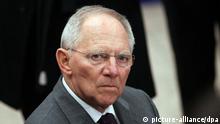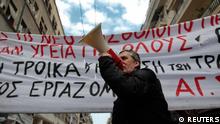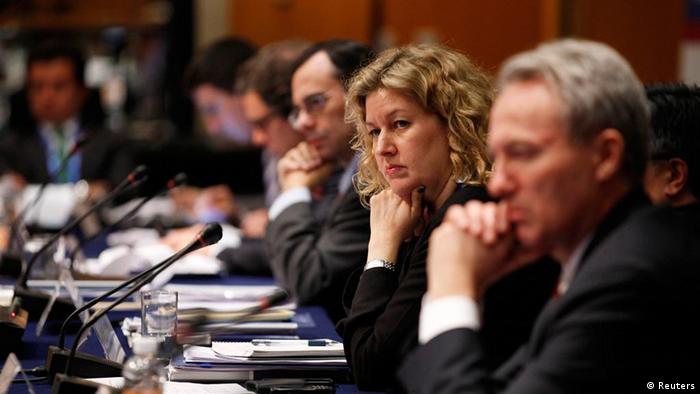Berlin hinted it was willing to discuss the size of Europe's firewall as the world's leading economies worked on Sunday to line up a deal in April on a second global rescue package worth nearly $2 trillion.
Germany said it would make a decision some time in March on strengthening Europe's bailout fund, a move other Group of 20 countries consider essential to clear the way for throwing extra funds into the International Monetary Fund (IMF).
"We explained to all our colleagues that we in Europe will take the decision in March, as the heads of state and government have decided," Germany's Finance Minister Wolfgang Schäuble told reporters on the sidelines of the meeting in Mexico City.

Schaeuble said Europe will reexamine its bailout volume in March
"Between March 1 and 31, we will again examine whether the volume of the mechanism is sufficient given recent developments," Schäuble said.
An agreement by Europe to merge its temporary and permanent bailout vehicles would create a $1 trillion (750 billion euro) war chest and open the door for other G20 countries to meet the IMF's request for $500 billion to $600 billion in new resources, on top of its current $358 billion in funds. Put together, this would total around $1.95 trillion in firepower.
Facing political opposition to a second Greek bailout in the Bundestag, Germany initially balked at enlarging Europe's rescue fund on the grounds that it would undermine efforts to impose fiscal discipline on indebted countries.
The softening of the German stance came as Schäuble said he assumed the Greek bailout package will win Bundestag support on Monday.
Pressure remains
A bigger European fund is a condition for major non-European economies before they lend more money to the International Monetary Fund, which would in turn provide an even bigger wall of cash to fight the crisis that has already claimed three euro debtor countries and now threatens the much bigger economies of Italy and Spain.
Pressure is likely to remain high on Europe to pledge more cash in order to keep markets calm and secure economic growth.

Despite bailout, Greece faces a bumpy road ahead
"In order to overcome the crisis, you have to get ahead of the curve and have a big enough bazooka," said Olli Rehn, European Commissioner for Economic and Monetary Affairs.
Several countries indicated that they stood ready to contribute to the IMF once the eurozone bolstered its efforts.
"I expect debate on strengthening of the IMF lending capacity will progress on condition that the problem of Europe's debt crisis is put to an end by the G20 meeting in Washington in April," said Japan's Finance Minister, Jun Azumi.
Brazil's finance minister Guido Mantega said on Saturday that emerging economies would become part of the rescue deal only if Europe acted first and if the IMF was reformed in such a way as to increase the voting power of countries like Brazil, Russia, China and India.
Author: Toma Tasovac (AFPE, dpa, Reuters)
Editor: Sean Sinico
Editor: Sean Sinico
- Date 26.02.2012
- Share Send Facebook Twitter more …
- Print print this page

Comments